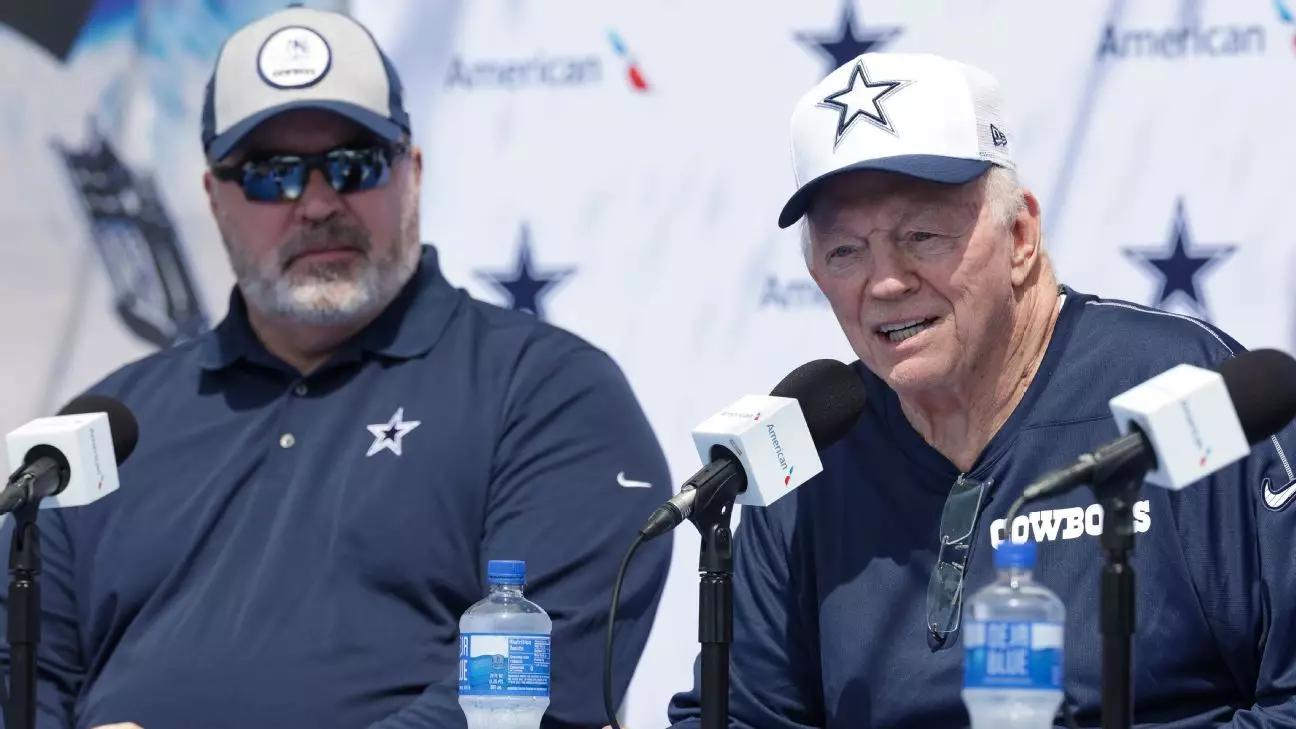The Dallas Cowboys have long been a team steeped in tradition and expectations, with a spotlight frequently illuminating the organization’s pivotal figures. Current discussions, particularly surrounding owner Jerry Jones and head coach Mike McCarthy, reveal deeper insights into the team’s strategy and future prospects. These conversations, emblematic of the Cowboys’ ongoing challenges and triumphs, highlight a crossroad where past performance meets future aspirations.
Recent remarks from Jerry Jones reflect a nuanced understanding of the immediate and long-term considerations within the Cowboys franchise. As he engages with McCarthy, it becomes clear that these discussions transcend the singular issue of McCarthy’s future. Instead, they encapsulate the larger framework of decision-making that encompasses player development and team performance. Jones alluded to the idea that each conversation inherently involves aspects of the future, advising against dwelling on previous defeats, which can cloud judgment. This approach not only stresses a forward-thinking mindset but also embodies the resilience necessary in professional sports—an attitude that situates the Cowboys in a state of perpetual reinvention.
However, the implications of this perspective are multifaceted. While it is essential to remain focused on the present and upcoming challenges, one must question whether the Cowboys have adequately addressed systemic issues that have hindered their playoff success. With the current season’s trajectory, including missed playoffs and injuries to key players like Dak Prescott and Trevon Diggs, the situation raises concerns about long-term strategies that extend beyond game-by-game thinking.
Performance Under Duress: A Mixed Bag of Results
The Cowboys have shown commendable tenacity, securing four victories in their last five outings despite facing adversity. Yet, as the team stands at a subpar 7-8 record, it begs an examination of the underlying factors contributing to their inconsistent performance. Jones’s acknowledgment of the coaching staff’s efforts amid challenges does highlight a commendable resilience, particularly from head coach Mike McCarthy. His recent milestone—surpassing Jeff Fisher in all-time regular-season wins—illustrates a level of success. However, the fact remains that the team has not progressed beyond the divisional round of the playoffs during his tenure, raising substantial questions about the alignment of leadership goals with the franchise’s storied legacy.
This dichotomy between interim success and historical achievement places current leadership styles under scrutiny. While the ability to motivate and foster young talent is commendable, the ultimate measure of success in the NFL hinges on a coach’s capacity to navigate postseason challenges. As fans and analysts dissect McCarthy’s era with the Cowboys, the consistent inability to advance in the playoffs could illuminate a need for reevaluation in both strategy and execution.
One of the most pressing concerns within the franchise revolves around contract status. With coaches on expiring contracts, looming uncertainty surrounds the organization’s future pathway. McCarthy, cognizant of the industry’s volatility, expressed that his focus remains on his staff and players rather than his own job security. This statement offers valuable insight into the leadership dynamic McCarthy has cultivated. Yet the irony remains: in an industry defined by results, the necessity for coaches to prioritize immediate performance over personal career trajectories often breeds an atmosphere of tension.
The Cowboys’ upward momentum and performance improvements demand a strategic balancing act from Jones and McCarthy. The question of retention cannot be divorced from the practical performance metrics that ultimately shape the franchise’s ethos. Stability and continuity are vital, but they must also align with accountability and tangible progress.
Looking Ahead: Navigating Uncertainty in the NFL
As the Cowboys move toward the final stretch of the season, the interplay between leadership decisions and on-field performance will be critical. The complexities of NFL contracts and player dynamics require a strong vision for the future—one that not only celebrates past accomplishments but also paves the way for sustained competitive advantages. Whether Jerry Jones views McCarthy as the steward for this journey remains to be seen; however, fostering a workplace grounded in resilience, strategy, and unity appears essential.
The Dallas Cowboys stand at a pivotal juncture, with their management and coaching reflecting on both immediate gains and long-term goals. With injuries and fluctuation in performance marking the current season, a comprehensive evaluation of leadership effectiveness, player development, and a concerted focus on postseason performance will determine the trajectory of one of the NFL’s most iconic franchises. The ability to evolve and respond to the demands of an ever-changing sport remains paramount, and the decisions made in the coming weeks will undoubtedly shape the future of the team.


Leave a Reply